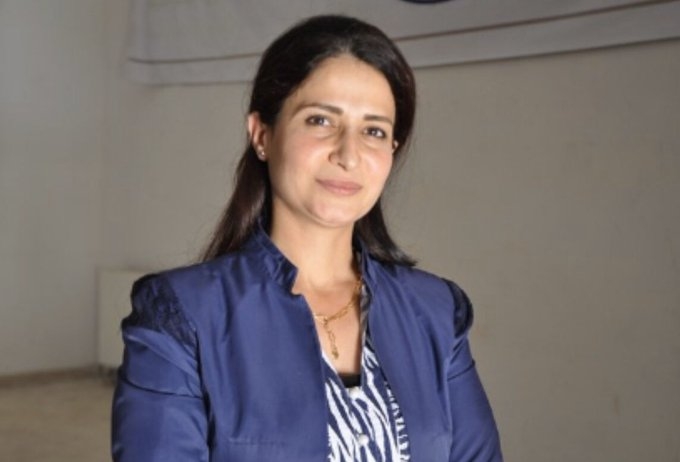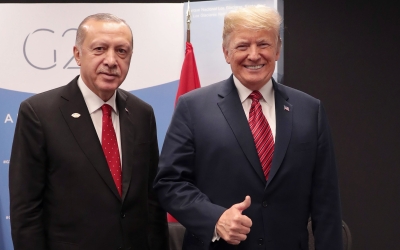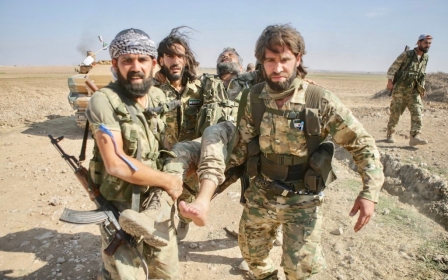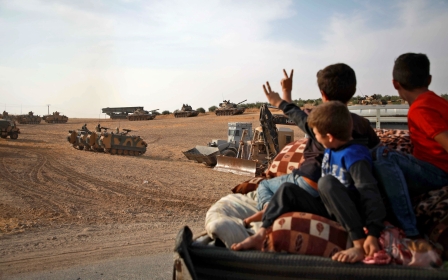Kurdish politician's murder prompted sanctions, Trump said to have told Erdogan

Donald Trump cited the murder of a female Kurdish politician as a reason behind the sanctions placed on Turkey in a call to President Recep Tayyip Erdogan, a Turkish official has revealed to Middle East Eye.
On Monday, Washington placed a series of sanctions on Turkish government officials and institutions in response to Ankara’s offensive in northeastern Syria.
Before the sanctions were announced, the Turkish and US presidents spoke by phone, with Trump outlining why he was now penalising Ankara after having previously seemed accepting of Turkey’s operation.
“Trump mentioned a couple of reasons for the sanctions he imposed on Turkey. One reasoning given by Trump was the killing of Future Syria Party leader Hervin Khalaf, a former member of the PKK’s Syrian political wing the PYD,” a Turkish official with knowledge of the conversation told MEE.
'One reasoning given by Trump was the killing of Future Syria Party leader Hervin Khalaf'
- Turkish official
“He also mentioned other things, such as loss of civilian life and fleeing Islamic State prisoners.”
New MEE newsletter: Jerusalem Dispatch
Sign up to get the latest insights and analysis on Israel-Palestine, alongside Turkey Unpacked and other MEE newsletters
Khalaf, a 35-year-old women’s rights defender, was reportedly dragged from her car along with her driver and other civilians, and summarily executed on the side of the road.
Her party, which emerged in northeastern Syria as the Islamic State group (IS) was rolled back by Kurdish-led forces, has had previous dealings with US officials.
IS militants and Turkish shelling were initially cited as being responsible for the cause of her death, with the Kurdish-led Syrian Democratic Forces (SDF) militia and Syrian Observatory for Human Rights activist group later blaming Turkey-backed Syrian rebels.
On Monday, two senior officials with the Syrian opposition said they did not know for sure that rebels under their command were responsible for the killings.
Speaking at a think tank event in Ankara, Hasan Hamada, a minister with the Syrian opposition government that the rebels fight under, said the execution was being investigated.
"We don’t know what really happened. We have doubts and will investigate the incident through our communications. We have a commission set on these kinds of violations," Hamada said in response to a question from MEE.
"The reasons that led to these killings aren’t clear. The killing happened on the Hasakah road and it is outside of our operational area. The perpetrators are unknown."
Mustafa Sejari, a political leader of the Syrian National Army rebel alliance, said that Khalaf’s killing was reported by YPG-allied "enemy" media.
"We can’t depend on their reporting. We doubt them. This needs to be verified by us and by a third party. This is propaganda to convince young Kurds to be on YPG’s side," he said, referring to the Kurdish militia that is a leading component of the SDF.
However, the United Nations said it is likely Turkish-backed rebel group Ahrar al-Sharqiya was responsible.
“Turkey could be deemed as a state responsible for violations by their affiliated groups as long as Turkey exercises effective control of these groups or the operations in the course of which those violations occurred,” UN human rights spokesman Rupert Colville told a briefing in Geneva.
Mediterranean drilling
Trump has faced a barrage of criticism since announcing he would withdraw all US personnel from northeast Syria, effectively waving through Turkish troops.
The Kurdish-led SDF that Turkey seeks to push from the Syrian-Turkish border was the United States’ principal partner in the battle against IS, and congressmen from both the Republican and Democratic parties have vowed to impose crippling sanctions on Ankara in response.
'Sanctioning the Turkish energy ministry indicates in a way that some people in Washington want to come after Turkey over its Eastern Mediterranean drilling'
- Turkish official
Though Trump soon followed suit, threatening on Twitter to ruin the Turkish economy if it stepped out of line in Syria, the sanctions imposed by the White House on Monday were designed to pre-empt harsher congressional ones, MEE understands.
Ankara believes the sanctions are not a response to the Syria offensive alone. On top of penalties placed on the defence ministry and a hike in steel tariffs, the energy ministry has also been sanctioned.
Turkish officials see this as linked to Turkey’s controversial drilling in the Eastern Mediterranean.
“Sanctioning the Turkish energy ministry indicates in a way that some people in Washington want to come after Turkey over its Eastern Mediterranean drilling as well. Otherwise, sanctioning the ministry doesn’t make sense at all,” the Turkish official said.
Middle East Eye delivers independent and unrivalled coverage and analysis of the Middle East, North Africa and beyond. To learn more about republishing this content and the associated fees, please fill out this form. More about MEE can be found here.





